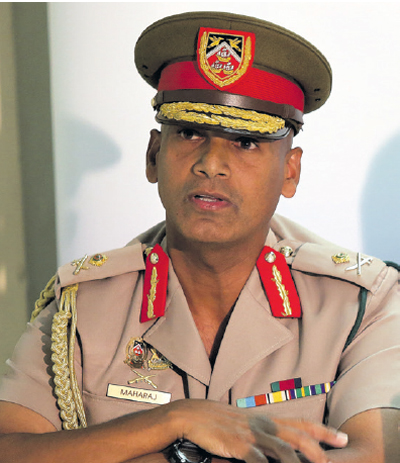(Trinidad Guardian) It was former chief of defence staff Kenrick Maharaj, “acting on his own volition”, who authorised Attorney General Faris Al-Rawi’s children to use the shooting range at Camp Cumuto where they were eventually photographed holding what appeared to be high-powered weapons.
Al-Rawi has been cleared of any wrongdoing in the matter, a report from the T&T Defence Force (TTDF) has stated.
And while there are photographs showing the children holding what appears to be guns, the TTDF’s Board of Inquiry (BOI) established to investigate the situation has “deduced that the Attorney General’s children were not allowed to have high-powered weapons belonging to the Defence Force in the presence of the Attorney General and members of the TTDF”.
The Sunday Guardian attempted to contact Maharaj for comments on the report’s finding but phone calls went unanswered. There was no reply to a text message or voicemail sent to his cellphone about the situation.
The photographs of Al-Rawi’s children were brought to the national spotlight in October last year when Opposition MP Dr Roodal Moonilal presented them in the House of Representatives during the budget debate.
Prime Minister Dr Keith Rowley slammed the TTDF for the situation saying the leak of the photographs was a serious breach of security.
Rowley and the TTDF have said that Al-Rawi’s children were the ones who were photographed but to date, Al-Rawi has not confirmed this.
The TTDF convened a BOI to investigate the situation.
After the investigation was completed the BOI’s Record of Proceedings report was presented to Chief of Defence Staff Brigadier General Rodney Smart “as a Top Secret document”.
On March 27 Opposition Senator Wayne Sturge wrote the TTDF to make the BOI’s findings public, exercising his rights under Section 25 (1) and (2) of the Freedom of Information Act Chapter 22:02.
On April 25 the TTDF, in a letter signed by Smart, responded to Sturge’s request.
“This (top secret) classification was given as the report contains secret and sensitive information, delicate aspects of the organisation’s combat tactics, techniques and procedures, vulnerabilities, and the identities and duties performed by persons who are actively involved in protecting national leaders and conducting operations against criminals, potential terrorists and other similarly intended operatives,” the letter to Sturge obtained by the Sunday Guardian stated.
“Hence, to place such a report in the public domain would severely jeopardise individual and organisational security and by extension, weaken the security of the nation,” it stated.
Questions raised by Sturge

According to the BOI Al-Rawi’s children accompanied him to Camp Cumuto on October 31, 2015.
“Based on the evidence adduced, the inquiry established that on 31 October, 2015, the Attorney General’s children accompanied him to the Trinidad and Tobago’s Regiment’s Cumuto Barrcaks.”
This was just over one month after Al-Rawi became Attorney General following the People’s National Movement’s (PNM) September 7, 2015 general election victory.
“The Attorney General was invited by the TTDF to witness a tactical display so that he would become familiar with the set of actions his security team may have to employ in the event of an incident,” the document stated.
The BOI stated that there was “no evidence that anyone in the Defence Force was complicit in the performance of their duties” as a result of this.
“It was established that the former chief of defence staff Major General Kenrick Maharaj, acting on his own volition, authorised the range practice. This practice is a standard procedure which is offered to all high-risk national leaders who come under the protection of members of the Defence Force’s Special Operations elements,” the letter stated.
“Consequently, there was no evidence that any member of the Defence Force was coerced into breaching any practice or procedure,” it stated.
The letter stated the Al-Rawi’s children were not given any “preferential treatment”.
“The board did not unearth any evidence which indicated that persons in the TTDF accorded preferential treatment to children of high-ranking government officials inclusive of the Attorney General’s children. As the children are immediate family members of the principal, they are also classified as protectees and need to be aware of drills that may have to be performed by the security team, in the performance of their duties,” the document stated.
The TTDF said it “has a tradition of encouraging visits by young persons to its establishments”. This is done to help the TTDF’s recruitment, it stated.
“Naturally, the shooting range is always the biggest attraction, when young persons’ visit military establishments. The Defence Force has over the years exposed many young members of the Trinidad and Tobago Cadet Force to actual live firing, in the hope that they would either join the Defence Force or go on to represent the country at various shooting disciplines,” the document stated.
The TTDF said sociologists, in particular military sociologists, “have identified such exposures by military institutions as being critically important, as it establishes a bond between militaries and young national who eventually may become future leaders and members”.
“Consequently, there was no need for General Maharaj or any other members of the Defence Force to be rewarded for what is a standard practice in the TTDF and likewise amongst other military establishments,” the document stated.
Al-Rawi did not abuse his power, the document stated.
“There is no evidence that the Attorney General abused his power while at Cumuto Barracks. The Defence Force found it was necessary for the Attorney General, as a principal being protected, to be exposed to possible scenarios and responses to these in the event that there was an incident to which the team was required to respond,” it stated.
The TTDF, in its letter said it expected Sturge would use the information provided to “assist in eliminating any form of ‘speculation and conjecture’,” on the issue.




